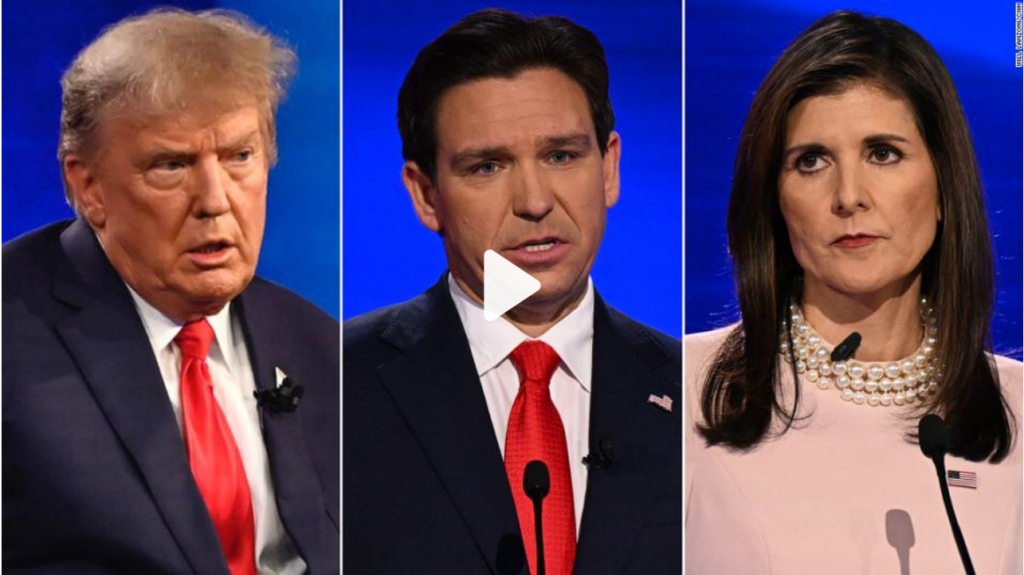The Iowa Caucus 2024 marked the beginning of the Republican Presidential race, and it was a significant event for political enthusiasts. The caucus is known for being the first major electoral event in the presidential nomination process, giving candidates a chance to prove their worth in front of party members. In this blog, we will analyze the outcomes of the Iowa Caucus 2024, with a specific focus on Trump’s victory and its implications for the Republican Party.
The Significance of the Iowa Caucus 2024
The Iowa caucus is the first major electoral event that sets the tone for the presidential nominating process. Iowa caucusgoers, including Iowa Republicans, play a crucial role in narrowing down the field of candidates, offering insights into general election dynamics. The results heavily influence the presidential nomination and can shape the trajectory of the race. The caucus process serves as an indicator of candidates’ strengths and weaknesses, providing a glimpse into the viability of their campaigns moving forward. The significance of the Iowa caucus extends beyond the state itself, as it can impact the momentum and support for candidates nationwide.

Final Voting Share at Iowa Republican Caucus 2024
As the Iowa Republican Caucus of 2024 approaches, the final voting share holds significant importance in determining the candidates’ political standing. This crucial data provides a clear picture of the support garnered by each candidate, enabling informed speculation on their prospects for the upcoming primary elections. The final voting share serves as a benchmark for evaluating the candidates’ performance, highlighting their strengths and weaknesses at this early stage of the race. Moreover, analyzing the final voting share offers valuable insights into voter preferences and trends, which can shape campaign strategies moving forward. the final voting share at Iowa caucus 2024 is as follows :
| Candidate | Votes | Vote share in % |
|---|---|---|
| 1. Donald J. Trump | 56,260 | 51.0% |
| 2. Ron DeSantis | 23,420 | 21.2 |
| 3. Nikki Haley | 21,085 | 19.1 |
| Total reported | 110,298 |
Also read : Buffalo Bills fan killed in shooting
The Unprecedented Trump Victory
Former President Donald Trump’s triumph showed Trump an insurmountable lead, making a significant impact on the Iowa Caucus 2024. His victory, with the largest margin of victory ever for a non-incumbent in the caucus, broke records, showcasing broad support within the party and sending a powerful message to the rest of the field. Trump’s win in the Iowa caucus was seen as unprecedented, setting the stage for the upcoming primaries and further solidifying his position within the Republican Party.
Implications for the Republican Party
Trump’s victory in the Iowa caucus on Monday night has solidified his position as the frontrunner for the Republican presidential nomination, showcasing the strength of his campaign strategy and his appeal to Republican voters. The overwhelming support for Trump within the party was evident in the Iowa Republican caucuses 2024 results, signaling his strong position in the presidential race. This victory not only demonstrated broad support within the party but also sent a strong message to the rest of the field, cementing his lead in the race for the first-in-the-nation primary on Jan. 23.

Analysis of Candidates’ Performances
The early returns unveiled a significant lead for the former President Trump, reflecting his dominance in the caucus results. The process provided strategic insights into the candidates’ strengths and revealed challenges they faced in the Republican race. These early returns served as an indicative glance at the state of the Republican contest, shedding light on the varied dynamics at play. The analysis of early returns highlighted Trump’s commanding position and offered a glimpse into the strategic landscape of the Republican party’s 2024 caucus, including the importance of having the right temperament.
The Unexpected Second Place of DeSantis
Governor Ron DeSantis’s strong performance in the Iowa caucus reshaped the Republican primary race, positioning him as a formidable challenger to Trump. His unexpected second-place finish in West Des Moines reflected the diverse nature of the Republican field, showcasing solid support in rural areas and underscoring his potential to appeal to a broad base of voters. DeSantis’s performance in the caucus has undoubtedly placed him as a strong contender, demonstrating his capacity to compete at a national level. The results solidified his position as a serious challenger for the GOP nomination, making it clear that the road to the presidential race is not a one-person show, with a disappointing fourth place finish for conservative entrepreneur Vivek Ramaswamy. The Florida governor’s unexpected second-place finish in West Des Moines in the Iowa caucus reshaped the Republican primary race.
Haley’s Struggle and Future Prospects
Nikki Haley’s performance in the caucus shed light on the challenges of the presidential campaign, reflecting the competitive nature of the race. The results indicated obstacles facing her campaign and raised questions about her future prospects, highlighting the complexities of the Republican nomination process.
The Sudden Exit of Vivek Ramaswamy
Entrepreneur Vivek Ramaswamy’s departure abruptly reshaped the dynamics of the caucus, impacting the campaign strategies of the remaining candidates. His unexpected exit shifted the focus of the presidential race and opened new opportunities for the rest of the field, altering the landscape of the Republican caucus race. Ramaswamy’s sudden departure drew attention to the uncertainties within the Republican party and prompted a reevaluation of campaign tactics. The void left by his exit forced candidates to adapt and pivot their approaches to secure their positions in the race, reflecting the ever-changing nature of political campaigns.
The Role of Trump’s Campaign Strategy
Trump’s campaign strategy, known as the trump campaign, played a crucial role in clinching a decisive victory in the Iowa Caucus 2024, demonstrating its effectiveness through the caucus results. The strategic precision of Trump’s campaign, including his use of Truth Social, was underscored by the caucus outcomes, resonating with a broad spectrum of Iowa caucusgoers. This success not only set the tone for the rest of the presidential race but also impacted the Republican party’s dynamics. The soundness of Trump’s campaign strategy has implications for the upcoming primaries in New Hampshire and South Carolina, as well as influencing the overall nomination process. As the campaign progresses beyond Iowa, the strategic strength exhibited by Trump is likely to be closely observed by the media, political analysts, and rival campaigns, shaping the narrative for the next stages of the race.
Media’s Early Declaration of Trump’s Win
The media’s premature announcement of Trump’s victory, made by The Associated Press, potentially impacted voter turnout and raised critical questions about the caucus process. This early declaration ignited controversy and criticism, prompting debates about the validity of the voting procedure. Moreover, it is speculated that the hasty projection may have influenced the actual caucus events, shedding light on the media’s powerful influence in shaping public opinion and political outcomes. The sensationalized declaration also underscored the need for responsible and balanced reporting, especially during significant political events like the Iowa Caucus 2024.
Post-Caucus Scenarios
Exploring the potential impact of post-caucus scenarios provides valuable insights into the candidates’ future strategies. Anticipating the next moves of the candidates becomes easier through an evaluation of these scenarios, contributing to understanding the evolving political landscape. Valuable information on the candidates’ campaign outlook is gathered by analyzing the post-caucus scenarios. This understanding is essential for predicting the candidates’ next steps, as it offers a comprehensive perspective on the evolving political dynamics. Additionally, assessing these scenarios is crucial for gaining foresight into the candidates’ approaches and responses based on the caucus results, guiding their future campaign strategies.
- Reaction from the DeSantis Camp
The DeSantis campaign’s response to the caucus results reflects their strategic approach to the election outcome. Understanding their reaction offers valuable insights into the candidate’s campaign strategy, providing a clear perspective on the camp’s stance. Additionally, analyzing their response sheds light on how the DeSantis campaign may approach future electoral challenges. This offers valuable perspectives on DeSantis’ future approach and strategic priorities.
- Impact on Biden’s Campaign Strategy
Following the Iowa caucus, the impact on Biden’s campaign strategy triggers a reassessment of priorities for the candidate. Understanding this impact is crucial for anticipating future actions and shaping the candidate’s next steps. Analyzing the impact provides valuable insights into the campaign’s direction and prompts a reevaluation of the candidate’s approach.
Moreover, assessing the impact on Biden’s campaign strategy helps determine potential vulnerabilities and strengths, allowing for adjustments and a more focused approach in future contests.
- Potential Shifts in Voter Sentiment
The results of the Iowa caucus can also lead to shifts in voter sentiment towards certain candidates. These changes may be due to various reasons such as surprising performances by candidates or unexpected outcomes. It is essential to analyze these shifts and understand their implications for future primaries and caucuses. In addition, tracking changes in voter sentiment allows campaigns to adjust their messaging and strategies accordingly. This can help them appeal to a wider range of voters and communities.
Could the Iowa Result Predict the Presidential Election Outcome?
Assessing the predictive potential of the Iowa result offers valuable insights into the general election outcome. Understanding its power provides perspectives on the presidential election dynamics. Evaluating its ability to forecast raises questions about candidates’ viability and contributes to understanding the electoral landscape.
While the Iowa caucus is often considered an important indicator of a candidate’s overall success in securing the presidential nomination, it is not always an accurate predictor of election outcomes. In some cases, candidates who have performed well in the Iowa caucus have gone on to lose their party’s nomination or even general election.
However, while it may not be a definitive prediction tool, there are certain aspects of the Iowa result that can provide valuable insights into potential election outcomes. For example, winning or placing high in key demographic groups (such as young voters or rural voters) could indicate strength and appeal among these crucial voting blocs, which could bode well for a candidate’s chances in the general election. Additionally, a strong showing in Iowa can generate momentum and media attention that can propel a candidate forward in subsequent primaries and caucuses, including the expected vote in the democratic party.
It is important to note that the Iowa caucus is just one piece of the larger puzzle when it comes to predicting the presidential election outcome. Factors such as fundraising, campaign organization, policy positions, and overall voter sentiment also play significant roles. Therefore, while the Iowa result can provide valuable insights, it should not be relied upon as the sole determinant of a candidate’s viability or chances of winning Presidential candidature.
Frequently Asked Questions
What is the Iowa Caucus 2024 and how does it differ from a regular primary election?
The Iowa Caucus, the first major election event of the presidential primary season in the United States, differs from a regular primary election. Instead of casting ballots, voters gather at a designated location to declare their support for a specific candidate.
What strategies do candidates typically use to win the Iowa Caucus?
Candidates vying for victory in the Iowa Caucus employ various strategies to sway voters. They invest significant time and money campaigning in the state, attending local events and engaging with constituents. Door-to-door canvassing, phone banking, and addressing the specific concerns of Iowa voters are common tactics implemented by candidates.
How do the results of the Iowa Caucus 2024 impact the overall presidential race?
Winning the Iowa Caucus can give a candidate momentum for subsequent primaries, influencing fundraising and media coverage. However, it’s important to note that no single caucus can determine the presidential race outcome. The Iowa Caucus sets the tone for the primary season but doesn’t guarantee victory.
Conclusion
In conclusion, the Iowa Caucus 2024 has provided some interesting insights into the Republican race. With Trump leading the pack, it is clear that his influence and appeal within the party are still strong. However, there have been some unexpected developments, such as DeSantis securing a surprising second place and Haley facing struggles in her campaign.
The factors influencing the outcome, including Trump’s campaign strategy and the impact of weather and turnout, cannot be ignored. As we move forward, it will be crucial to closely monitor the post-caucus scenarios and their implications on the candidates’ strategies. While the Iowa Caucus is not always an accurate predictor of the presidential election outcome, it does provide valuable information about the current state of the race.



